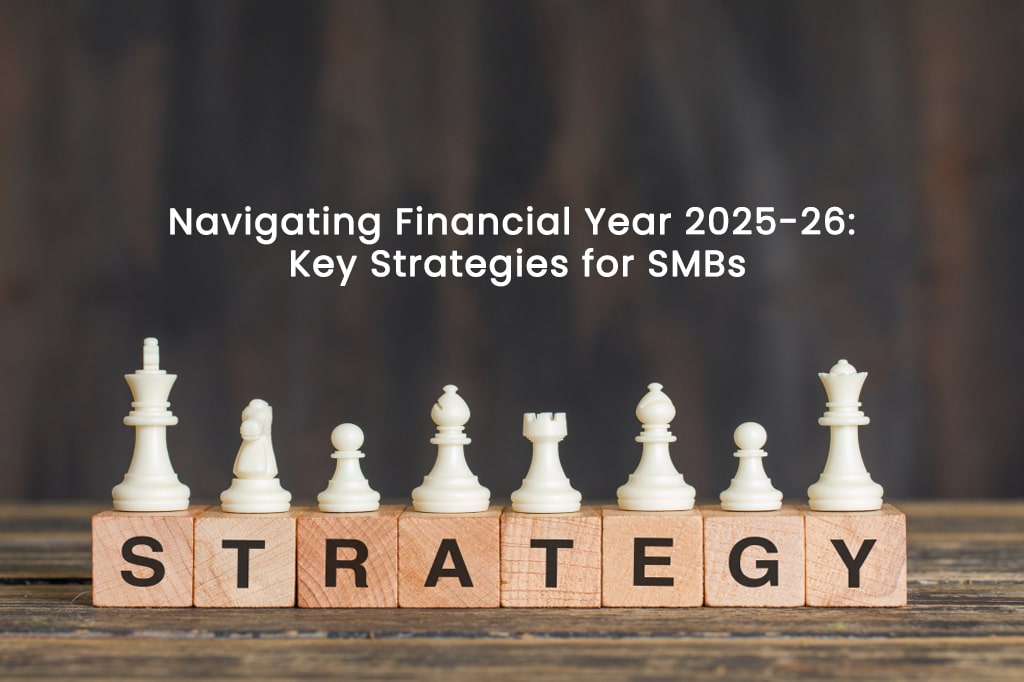As we step into the financial year 2025-26, small and medium businesses (SMBs) must prepare for regulatory changes, technological advancements, and market trends. A well-structured financial strategy can drive growth, ensure compliance, and enhance operational efficiency. Here’s a roadmap to navigate the upcoming financial year effectively.
1. Understanding Regulatory Changes
Income Tax Updates
The Indian government has introduced key amendments in the Income Tax Act to simplify compliance and enhance transparency. Major changes include:
- Updated Tax Slabs: Ensure your tax planning aligns with the latest slab rates and exemptions.
- Higher TDS/TCS Compliance: Businesses must track and report tax deducted at source (TDS) and tax collected at source (TCS) to avoid penalties.
- Tax Incentives for Startups: The government has extended benefits for eligible startups, including tax holidays and reduced corporate tax rates.
GST Reforms
With the increasing digitization of tax compliance, notable changes in the GST Act include:
- Revised Input Tax Credit (ITC) Rules: Ensure proper documentation to claim ITC without issues.
- Mandatory E-Invoicing Expansion: Businesses with turnovers above Rs 5 crore must now adopt e-invoicing.
- Stricter Compliance Norms: Non-compliance may lead to GST registration suspension, emphasizing the need for accurate filing.
Companies Act Updates
Corporates must stay updated on amendments in the Companies Act, 2013, including:
- Higher Disclosure Requirements: Companies must now provide more detailed financial statements and related-party transactions.
- Simplified Compliance for MSMEs: The government is introducing relaxation in certain compliance requirements for MSMEs to ease regulatory burdens.
2. Embracing Technology: The Rise of Cloud-Based SaaS
Businesses must leverage technology to streamline financial management. Platforms like Zoho Finance Plus, Odoo, and ERPNext offer integrated cloud solutions for accounting, invoicing, and tax compliance. Benefits of adopting cloud-based SaaS solutions include:
- Real-Time Financial Data Access: Improve decision-making with instant access to financial reports.
- Automated Tax Compliance: Reduce manual errors and ensure timely GST and income tax filings.
- Scalability and Cost Savings: Cloud solutions eliminate the need for heavy IT infrastructure investment.
![]() For detailed budgeting insights, check out Accovet Budgets Post
For detailed budgeting insights, check out Accovet Budgets Post
3. Market Trends: Scope of Trade and IT in India
Growing Trade Opportunities
India’s trade sector is booming with increasing exports and government incentives like PLI (Production-Linked Incentive) schemes. Key industries expected to grow in 2025-26 include:
- Manufacturing & Electronics: ‘Make in India’ policies continue to support domestic production.
- E-Commerce & Retail: Digital marketplaces are expanding, making online business a lucrative option.
IT Sector Growth
The Indian IT industry remains a global leader. Key trends include:
- AI & Automation: Businesses are investing in artificial intelligence to optimize operations.
- Cybersecurity Investments: With increasing digital transactions, businesses must protect data from cyber threats.
4. The Importance of Corporatization
Many SMBs hesitate to incorporate their business, but transitioning from a proprietorship to a Private Limited Company or LLP can provide numerous advantages:
- Limited Liability Protection: Shields personal assets from business liabilities.
- Enhanced Credibility: Corporates attract better clients, investors, and lending opportunities.
- Tax Benefits: Corporate tax rates can be more favorable than individual taxation.
![]() Learn more about corporatization benefits on Accovet Insight
Learn more about corporatization benefits on Accovet Insight
5. Strengthening Compliance & IP Protection
Ensuring Regulatory Compliance
- Timely GST and Tax Filings: Avoid penalties by keeping track of due dates.
- Audit Completion: Businesses exceeding turnover thresholds must complete their statutory and tax audits on time.
- Legal Agreements: Ensure vendor and employee contracts comply with the latest legal standards.
Protecting Intellectual Property Rights (IPR)
SMBs must safeguard their brand, products, and innovations through:
- Trademark Registration: Protects brand identity from misuse.
- Patent Filing: Secures unique product designs and innovations.
- Copyright Protection: Ensures exclusive rights to digital and creative assets.
![]() Read more about IP protection strategies on Accovet Insight
Read more about IP protection strategies on Accovet Insight
6. Budgeting & Financial Analysis
A robust budgeting and financial analysis strategy is crucial for sustained business growth. Steps to follow:
- Revenue Forecasting: Use historical data and market trends to predict future income.
- Cost Optimization: Identify unnecessary expenses and streamline operations.
- Investment Planning: Allocate funds wisely for expansion, digital transformation, and market penetration.
![]() For expert financial planning, visit Accovet Budgets Post
For expert financial planning, visit Accovet Budgets Post
Final Thoughts
Financial Year 2025-26 presents immense opportunities for SMBs willing to adapt to new regulations, embrace technology, and prioritize compliance. By proactively planning tax strategies, integrating cloud solutions, and securing intellectual property, businesses can drive sustainable growth.
Stay ahead, stay compliant, and build a future-ready business!
Experienced Business Consultant with a demonstrated history of working in the accounting industry. Skilled in Tax Preparation, Business Planning, Internal Audit, Account Reconciliation, and Accounting. Strong consulting professional with qualifications from ICAI & ICSI





